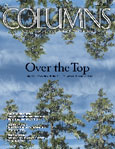March 2005 -
Letters to the Editor
March 2005

Taking a Stand
I was pleased to learn about the UWs College of Education and the Carnegie Foundation focus on teacher retention [“Prep School,” Dec. 2004]. I graduated from the UW’s graduate teacher education program in 1999 and taught inner-city middle school for the last five years in New Haven, Conn…I love teaching and will eventually go back to it.
...Teaching is so important and challenging that teachers do need more support. I felt very prepared by UW’s program, but nothing prepares you for teaching like day-to-day teaching. I applaud the vision of the program to extend into the first two years of a teacher’s professional life support and mentoring. This is especially crucial for teachers who choose to teach in poor rural and urban schools where the challenges in the classroom are exponentially greater and where a teacher must work so much harder to make a difference. These schools experience the greatest teacher turnover and typically get the least experienced and most burnt-out teachers. Students of schools like the one I taught in are lucky to get one or two effective teachers throughout the entire course of their elementary and middle school education.
Many promising young teachers eventually leave for suburban districts where typically there is greater support and fewer challenges, or even opt to leave the profession altogether. The collective knowledge and experience draining out of schools is staggering and is detrimental to the students’ education. Teacher support and mentoring is one very effective way to continue to grow effective and satisfied teachers. Kudos to UW and Carnegie for taking a stand and making a difference.
Stephanie Tatel, ’99
Charlottesville, VA
The Business of Teaching
I read with interest the article “Prep School” in your December issue. I’m glad the University is developing a support system designed to encourage people to enter teaching and stay in teaching. However, I’m concerned that too much emphasis may be put on the academic preparation, and too little emphasis focused on methods for classroom management, paperwork management and student behavior management.
After over 20 years as a teacher in both elementary and secondary classrooms, I was ready to quit teaching due to sleep deprivation, stress-related illnesses and a helpless feeling of “What can I do?”
… Where did I turn? I began to take courses from the business community—designed for managers. These classes had titles like, “How to manage difficult workers and turn them into productive workers” and “How to manage paperwork and meet multiple deadlines.” I took the specific ideas designed for workplace managers, modified them to succeed in a classroom, and gave it a try. I began to teach workshops in 1994, and in 1999 I began to talk to teachers on a national level. I gave them specific ideas that I knew would work in classrooms.
My informal data collection (gathered from teachers after presentations) indicates that many, if not most, teachers are not leaving teaching due to a lack of subject matter knowledge. They are leaving because of the management challenges. They love teaching but they want the non-work-related part of their life back…I pray the University will put a major focus on the management part of teaching. My “research” tells me this is what will keep our teachers in classrooms.
Sandy LaBelle, ’70, ‘75
Covington
Biblical Revelation
Thank you for including my entry to “The Way We Were” [Dec. 2004]. The article by Ann Taylor about Professor Edmond S. Meany reminded me of a course on Pacific Rim history that I took in 1929. He was particularly enthusiastic when describing the conversion of Washington Territory to a state, as he was present at the ceremony in Olympia in 1889. He related that when the ceremony was completed and the crowd was dispersing, a tall young member of the militia quietly walked up to the lectern, picked up the Bible which had been used in the ceremony, slipped it under his uniform and went out the back door.
The professor paused a moment, recollecting the situation, chuckled to himself, then continued, “Sometime later I gave it to the historical society.”
Clifford Bartells, ’30
Mercer Island
Corrections
Two typographical errors resulted in the misspelling of UW faculty names in the December 2004 issue. In the article on Nobel Laureate Linda Buck, the correct spelling of her lab director is Psychology Professor Walter Makous. In the article on the UW memories project, the correct spelling of the 19th century literature specialist is English Professor Sophus Winther.
We also erred in the “In Memory” section of the December 2004 issue when we got both Malcolm Bryant’s name and age wrong. Here is how the announcement should have read: Malcolm S. Bryant, ’34, Scottsdale, Ariz., age 93, Dec. 10.
We usually receive more letters than we have room to print. To read these extra letters, please visit our Web site at www.washington.edu/alumni/columns.
Letters to the editor are encouraged. Brief letters are more likely to be published; longer letters may be edited due to lack of space. Please include a daytime phone number and send all correspondence to: Editor, Columns Magazine, 1415 N.E. 45th Street, Seattle, WA 98105. You may send e-mail to columns@u.washington.edu or send a fax to 206-685-0611.
|
Letters to the editor are encouraged. Brief letters are more likely to be published; longer letters may be edited. Please include a daytime phone number.
SEND ALL CORRESPONDENCE TO:
columns@u.washington.edu
--or--
Editor, Columns
Magazine, 1415 N.E. 45th Street, Seattle, WA 98105
--or--
fax to (206) 685-0611
|
